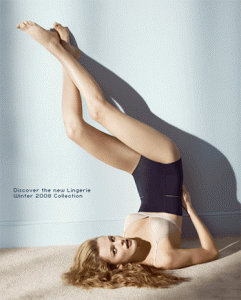
That’s what Lisa Hilton asks in the Daily Beast this week — although she’s actually asking, “What’s wrong with living off of coffee and cigarettes? Better than being fat!”
Katie Drummond over at Slant/Truth gives Hilton’s piece a great take-down, pointing out that while official eating disorder diagnosis rates may not be skyrocketing, a lot of women engage in disordered eating without having a diagnosed eating disorder. But Hilton isn’t just concerned with what she deems “hysteria” over super-skinny models; see, she’s worried that for all of our obsessing over skinny girls, we’re actually really fat. Obese, even! And don’t you know that being obese is unhealthy?
Which is kind of funny, given that “obesity” is defined by a pretty simplistic height/weight calculation and doesn’t mean a whole lot in terms of actual health, while “anorexia” and “bulimia” are significantly more complex psychological diagnoses which do reflect serious health issues. In other words, they aren’t really comparable at all.
So why do feminists (and other people who are concerned about women’s health) focus on anorexia and unrepresentative media images more than we go around fat-shaming larger women? Quite simply because there are huge numbers of women who are negatively impacted by narrow beauty standards. Hilton says it’s disrespectful to argue that anorexia is just about wanting to look skinny, since if you talk to actual anorexics, they’ll tell you it’s a lot deeper than that. And that’s a fair point. But then Hilton herself uses the “empowered” example of a teenage model who lived off of coffee and apples for two years to make a bunch of money. Was that model anorexic because of deep psychological issues that went beyond wanting to be skinny? Maybe, but it doesn’t sound like it. It sounds like she knew she could make a ton of money for being skinny, so she did what she had to do. And, hey, do your thing — the point is that Hilton’s piece itself reveals that the world of disordered eating is a complicated one, and it isn’t a choice between “women are anorexic because they want to be skinny” and “women are anorexic because they have mental health problems.” The point is that an ultra-thin ideal does harm to women in large and small ways; full-blown anorexia is only one tiny component.
I happen to like fashion quite a bit. I happen to think that part of the reason it’s treated as shallow is because it’s something that women primarily consume, it’s something that has been developed primarily for women, and it’s something that women have an increasing role in creating — unlike many other forms of art. But that said, a big problem with fashion-as-art is that instead of the clothes being decorative, the woman herself is expected to be the decoration. Thinness itself is fine; thinness presented as the only way to be beautiful is a problem, because it reinforces the idea that a woman has an obligation to look a certain way for the sake of others’ visual preferences. The pressure to be thin doesn’t just impact what we eat; it impacts the way we interact with the world. When we see ourselves as existing for others’ viewing pleasure, it’s difficult for us to experience pleasure for our own sake. It is difficult for us to find self-worth in places other than our physical appearance — especially when thin-obsession happens in a culture that repeatedly emphasizes that our ultimate goal is to find someone who will marry us, and beauty is a woman’s greatest currency in the marriage market (unlike men, whose value ties more to money and power). Women end up living a series of smaller problems with food. Those problems can be as large as dying of starvation or as small as having your day ruined because you can’t fit into a particular pair of pants. Mostly, though, they fall into a really sad and slightly deranged middle ground, like the woman who feels like she has to make a choice between sex and eating, or the woman who under-performs at work because she’s hungry, or the woman who spends $10,000 she doesn’t have on cosmetic surgery, or the woman who believes she’s beautiful but is told she’s wrong because she’s also fat, or the woman who doesn’t buy into beauty culture at all but is punished for it, or the woman like me who, for all her accomplishments and successes, has a persistent nagging feeling of failure because she just isn’t as thin as she would like to be.
That’s why this matters — not just because some of us are starving (although we are), and not just because some of us are sick (although we are). But because many of us are just not living as fully, pleasurably or successfully as we could live. Because being charged with being beautiful means that some women — a lot of women — are just never going to be viewed as really women, because their size or age or skin color takes them out of the running.
If a model wants to starve herself for a million dollars, by all means, do your thing girl — it’s not healthy and you might die or face serious long-term physical issues, but to each their own I guess. My problem isn’t with individual women who make individual decisions about how to best manage their lives. My problem is with a culture that expects women to physically present themselves in a particular, narrow way, and that punishes women who don’t conform to narrow beauty standards. And my problem is most certainly with apologists like Lisa Hilton, who insist that this is all no big deal and it could be worse — people could be fat.